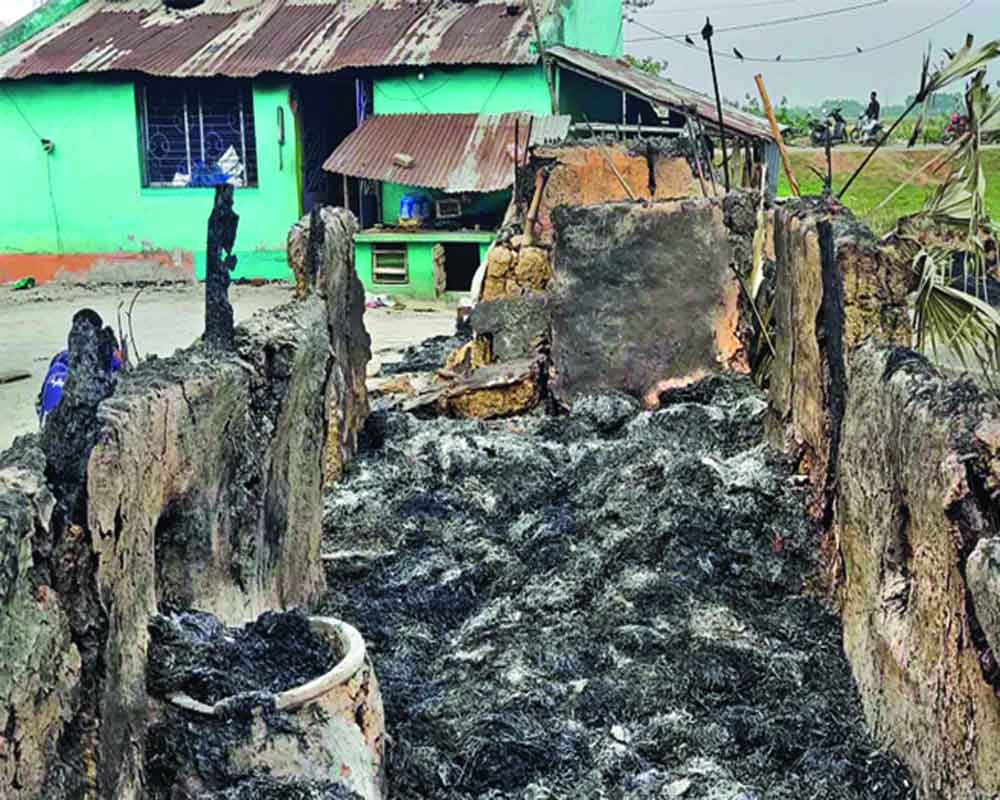It appears that India is a half-sovereign State; the concept was innovated by a German jurist on international law in the 18th century
The gruesome killings at Rampurhat in Birbhum district can be seen as another link in the chain of half-sovereignty that has reigned in our country for long. The US Declaration of Independence in 1770 was the first document to enunciate sovereignty as an essential element of the new State. The French Constitution of 1791 stated: “Sovereignty is one, indivisible, unalienable and, imprescriptibly, it belongs to the nation; no group can attribute sovereignty to itself nor can an individual arrogate it to himself.” The concept was first thought of by Jean Bodin of 16th century France to signal the progress from feudalism to nationalism.
Birbhum is not the only district affected by violence. The Government recently stated that there still are 40 districts affected by Maoism; in 2005, it stood at over 200 districts. On Independence Day that year, the Maoists had killed Andhra MLA C Narsi Reddy. Only two weeks earlier, seven persons were butchered in Bastar district of Chhattisgarh, again by Maoists. Leave alone civilians, even police could not enter sub-divisional towns in the affected areas.
What is happening in West Bengal is not accidental as it has been the policy of the Congress, the Left Front and Trinamool Congress to encourage infiltration, and thus expand their vote bank. Had it not been so, how would these parties explain their support to the IMDT Act in Assam and being unhappy at its having been struck down as ultra vires by the Supreme Court? Assam was the first State to enact a law of this kind whereby the onus was on the complainant to prove that an immigrant was guilty of having become one through infiltration; not the other way around as in all other States. Such laws cannot survive or even be promulgated in a sovereign country.
Birbhum has understandably set off a discussion in the print media as to whether the bureaucracy is letting the country down. There is no doubt that the country’s bureaucracy has substantially become subservient to the Ministers. To an extent it is because of human temptation for comfort of work and ease of promotion. There is, however, another factor which is that the bureaucracy’s ethos is outdated. From the British era Indian Civil Service, they learnt to believe that they are not servants but owners of the country.
They, however, forgot that now the owners are the citizens and not the Ministers or their political parties. Moreover, the administrative services bureaucrats began with the belief that they are administrators or enforcers of rules and procedures. Over the years, recently more so, there has been rising consciousness with regard to development. When a people want development, the politicians will hurriedly offer or at least promise vikas. This becomes a call to the IAS officers to act like managers who are expected to try and create surpluses from the local economy for material growth. In a way, the officer, now ideally a manager, has to move from his focus on procedures to profit or surplus in order to make his district more modern and altogether better. The responsibility for law and order must be shifted entirely to the police service officers. With the progress of technology and its machinery, the work of maintaining law or order is easier than before.
In fact, all officers (IAS, IPS or otherwise) would have to reorient their focus. They should all try to bend towards becoming development managers from the erstwhile administrative officers. This is a change from a static vocation to a dynamic approach. The politicians must also change their functioning; they cannot talk of development and behave like old times when connecting with people and collecting election funds were sufficient.
The bureaucrats are permanent and career-long rulers while the politician is quite frequently a bird that passes after a five-year term. The former should take up responsibility for the long term and reformist aspects of governance. The Congress has always been pro-Muslim. This is clear from the fact that wakfs and Muslim personal law still remain untouched collectively; the wakf properties represent the biggest urban landlords in India, say, up to six lakh acres. The demand for Taj Mahal by the UP Sunni Wakf Board and that for Bibi ka Maqbara at Aurangabad by the Maharashtra Wakf Board is baseless as it is on the ground that these contain qabrs. A sovereign State should nationalise all its properties.
Similarly, Muslim personal laws continue to be sacrosanct and above the purview of the Constitution. Contrary to the Supreme Court’s view, the Muslim community now appears to have set up Sharia courts known as Darul Qaza in a number of States to adjudicate on matters concerning marriage, divorce, etc. There are, therefore, two systems of law and justice functioning in the country — one Muslim and the other Indian.
The evident conclusion would be that India is a half-sovereign State. This concept was innovated by a German jurist on international law, JJ Moser, who lived in the 18th century. India has some attributes of sovereignty, like its belonging to the nation and not to any individual. But between the Sharia and wakf, sovereignty is shared and not absolute.
(The writer is a well-known columnist, an author and a former member of the Rajya Sabha. The views expressed are personal.)


























